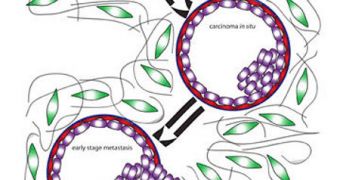Scientists at the Rensselaer Polytechnic Institute (RPI) are proud to announce that one of their colleagues has just been awarded an American Cancer Society (ACS) Research Scholar Grant, in acknowledgement of his work on studying cancer.
Researcher Lee Ligon has been investigating breast cancer, and the interactions it causes as it spreads throughout the entire body, for many years, and is now a leading authority in the field.
The ACS will support these endeavors for the next four years, with a total of $720,000 divided equally over this period of time.
“We’re trying to figure out how cancerous and non-cancerous cells communicate with each other, how they bind to each other, and what the consequences of those interactions are,” the expert himself says.
“The Research Scholar Grant is a highly prestigious award for junior faculty,” adds the head of the RPI Department of Biology, Susan Gilbert. She is also a professor at the Institute.
“This grant acknowledges the importance of Dr. Ligon’s work in the field of cancer research and heralds a promising future of valuable insights and discoveries,” the representative says further.
One of the most important focuses in Ligon's research is a special class of proteins called cadherins, which are used in the body to make cells adhere to each other.
This enables these basic building blocks to produce tissues, organs and other structures. Each different function that cadherins may have is expressed by a different cell, the expert says.
“Cells have to stick together appropriately and if they express the same cadherin they will. But that only works in the normal situation when cells are sticking to cells that they’re supposed to stick to,” Ligon explains.
“We’re interested in the situation in tumors,” he adds. The scientist says that an estimated 9 in 10 cancers around the world originate inside epithelial cells.
This type of cells plays an important role, by forming barriers between the inside and the outside of the body. They can be found in skin, intestines and milk ducts of the breast.
The reason why there are more prone to cancer is that they need to be replenished a lot more often than other cells types, which opens the way for them to divide abnormally, or experience other mutations.
Ligon's research is very relevant today, considering that breast cancer is a widespread condition, that affects hundreds of thousands of women around the world.
Therefore, any improvements in treatment or diagnostics could have significant consequences, and could help save countless lives each year.

 14 DAY TRIAL //
14 DAY TRIAL //